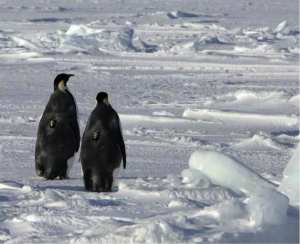MS in Marine Science: Physiological Ecology of Emperor Penguins
Dr. Birgitte McDonald of the Vertebrate Ecology Lab, Moss Landing Marine Laboratories at San José State University is seeking an MS student interested in physiological ecology of seabirds.
Project Overview

The survival and success of marine predators depends on their ability to locate prey in a heterogeneous environment. To do this the predators need to be able to adjust their foraging behavior depending on the conditions they encounter, particularly in a changing environment. As ice-dependent top predators, Emperor Penguins are indicators of both drastic and subtle changes occurring throughout the food web and the state of the sea ice. Like other predators, they are vulnerable to environmental change: these changes permeate through the food web, modifying foraging behavior, and ultimately survival and reproduction. Despite their importance in the Southern Ocean ecosystem, relatively little is known about the mechanisms Emperor Penguins use to find and acquire food. This National Science Foundation funded project combines a suite of technological and analytical tools to gain essential knowledge on Emperor Penguin foraging energetics, ecology, and habitat use during critical periods in their life history. Specifically, we will investigate the foraging energetics, ecology, and habitat use of Emperor Penguins at Cape Crozier, the 2nd most southern colony, during late chick-rearing. Energy management is particularly crucial during late chick-rearing as parents need to feed both themselves and their rapidly growing offspring, while being constrained to regions near the colony. The masters student will complete a thesis that contributes to the projects goal. Two years of NSF-funded tuition and stipend support are available for the selected student.
Qualifications
Required qualifications
- Either a bachelor’s degree in Biology, Physiology, or Ecology with skills in quantitative analyses, or a bachelor’s degree in Statistics or Mathematics with documented experience in biology.
- Research experience
- Excellent spoken and written communication skills
- The ability to work independently and work well as part of a team
Preferred qualifications
- Field experience, ideally with seabirds or marine mammals
- Experience with R or MatLab
Interested candidates should email a cover letter with your research interests and experience, a CV, unofficial transcripts, and GRE scores (if available) to Dr. Gitte McDonald (gmcdonald@mlml.calstate.edu). Qualified candidates will be contacted to discuss the project and program further and encouraged to apply to the MS program (Due Feb 1, 2021). Emails with required attachments received before December 1, 2020 will receive first consideration, but the position will remain open until a student is selected.

